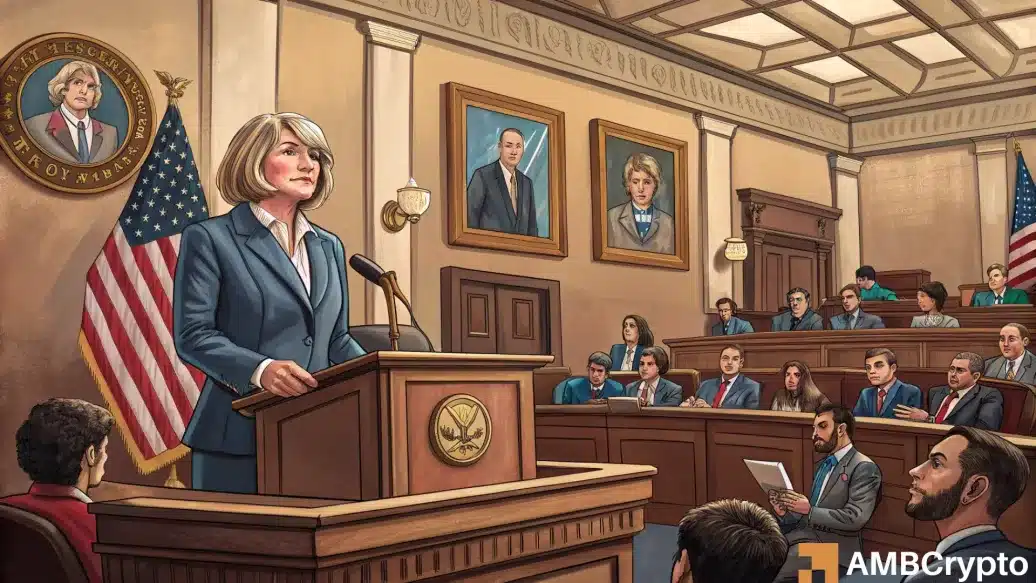Senator Lummis Drops Bombshell: Could Crypto Regulation Be Delayed Until 2026?

Crypto's regulatory limbo might stretch longer than anyone expected—Senator Cynthia Lummis just hinted at a potential delay until 2026. Here's why Wall Street won't care until it's too late.
### The Political Gridlock Behind Crypto's Future
Lummis—a rare Bitcoin bull in Congress—revealed behind-the-scenes clashes stalling key legislation. No specifics yet, but insiders smell another classic D.C. 'kick-the-can' maneuver.
### Why 2026 Could Be Crypto's Make-or-Break Year
Markets hate uncertainty, but traders love volatility. This delay could keep crypto wild west enough for degens while 'responsible investors' clutch their pearls. Either way, the SEC will still find a way to sue a meme coin.
### The Bottom Line
Regulation was always coming… just never quite *now*. Meanwhile, crypto VCs will keep partying like it's 2021—until the music stops or the feds finally show up with handcuffs. Whichever comes first.
Senator Lummis provides clarity on two crypto bills
Speaking at the Bitcoin Policy Institute Summit in Washington, D.C., Lummis emphasized that while Europe and Singapore already have crypto regulations, the U.S. is still behind.
In a separate interview on CNBC’s Squawk Box, Lummis noted,
“I mean, it’s still we’re late, aren’t we? Compared to some countries in the rest of the world, and it’s sorely needed… Europe has regulations. Singapore has regulations.”
She added,
“But they’re not exactly tailored to what WOULD be a more robust U.S. economy style of regulation.”
Notably, President Donald TRUMP initially set a deadline for August. However, Senator Lummis warned that delays are likely. She expects the legislation’s final phase could extend into early 2026.
This is due to the urgency and complexity of stablecoin regulation.
“Now, I’m not saying combine them, but they both need to pass this year. I know that there is enthusiasm at the WHITE House for having the Congress send them a win in the area of stablecoins.”
During the Summit itself, Lummis stressed the need to pass stablecoin laws in 2025, with strong support from the White House.
“The White House is ahead of us. They’ve already passed the GENIUS Act.”
She added,
“There’s real excitement at the White House to see Congress send them something they can sign, specially around stablecoins.”
But road blockers persist
However, despite some bipartisan progress on crypto legislation, evidenced by 18 Democrats supporting the GENIUS Act alongside Republicans like Senator Lummis, division remains within the Democratic ranks.
A growing faction is hesitant to advance any crypto-related bills without first scrutinizing President Trump’s direct ties to the industry.
Concerns have mounted over his memecoin ventures, a personal stake in the family-run World Liberty Financial, and sizable political contributions from crypto executives.
At a recent Senate hearing, several Democratic lawmakers were absent, and those present voiced concerns over potential conflicts of interest tied to Trump’s crypto holdings and political donations from industry players.
Acknowledging the divide, Lummis said,
“I don’t want to come up with a piece of legislation that the other side of the aisle feels they haven’t had adequate input in, and so that is going to require maybe me to go out of my way to pursue additional discussions directly with the other side of the aisle.”
What’s more?
All eyes are now on the U.S. House of Representatives, which must decide whether to incorporate the GENIUS Act into the broader Digital Asset Market Clarity framework, or advance it independently, as suggested by President Trump.
The stakes are high: the stablecoin market, currently valued at $256 billion, could surge to $2 trillion by 2028 if clear legislation is passed.
However, the Senate remains a key obstacle, requiring bipartisan cooperation for any crypto-related bill to succeed.
Senator Lummis, a vocal supporter of President Trump’s pro-crypto stance, has previously advocated for a national bitcoin reserve.
She continues to highlight how current legislative efforts align with the White House’s vision for digital assets.
Subscribe to our must read daily newsletter

